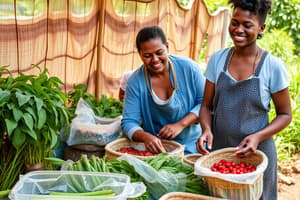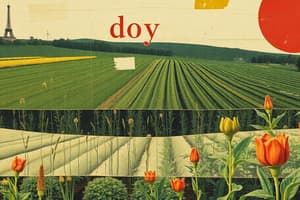Podcast
Questions and Answers
What is integrated pest management?
What is integrated pest management?
A holistic approach to managing pests that includes monitoring, identification, biological control, and other non-chemical methods.
How does conservation tillage benefit the soil?
How does conservation tillage benefit the soil?
It minimizes soil disturbance, reducing erosion and increasing soil organic matter.
What is the purpose of crop rotation?
What is the purpose of crop rotation?
To improve soil health and prevent disease by growing different crops in the same area over a set period.
Why is food preservation crucial?
Why is food preservation crucial?
What is the purpose of sustainable agriculture practices?
What is the purpose of sustainable agriculture practices?
What is the expected world population by 2050?
What is the expected world population by 2050?
What is the purpose of canning food?
What is the purpose of canning food?
How does freezing food help in preservation?
How does freezing food help in preservation?
What is the main goal of genetically modified crops (GMCs)?
What is the main goal of genetically modified crops (GMCs)?
What is the function of Bt corn?
What is the function of Bt corn?
What is the purpose of Golden rice?
What is the purpose of Golden rice?
Why is irrigation essential for maintaining crop production in dry regions and during droughts?
Why is irrigation essential for maintaining crop production in dry regions and during droughts?
What is the primary characteristic of surface irrigation?
What is the primary characteristic of surface irrigation?
What distinguishes drip irrigation from sprinkler irrigation?
What distinguishes drip irrigation from sprinkler irrigation?
What is the key aspect of organic farming in terms of pesticides?
What is the key aspect of organic farming in terms of pesticides?
What is the purpose of composting in organic farming?
What is the purpose of composting in organic farming?
Study Notes
Improvement in Food Resources: Sustainable Agriculture Practices, Food Preservation Techniques, Genetically Modified Crops, Irrigation Methods, and Organic Farming
The world's population is expected to reach 9.7 billion by 2050, and meeting the food demands of such a large population while minimizing environmental impacts is a significant challenge. To address this issue, various improvements in food resources have been implemented, including sustainable agriculture practices, food preservation techniques, genetically modified crops, irrigation methods, and organic farming.
Sustainable Agriculture Practices
Sustainable agriculture practices aim to maintain and improve the long-term social, economic, and environmental health of agricultural systems. Some key practices include:
- Integrated pest management: A holistic approach to managing pests that includes monitoring, identification, biological control, and other non-chemical methods.
- Conservation tillage: A method of tillage that minimizes soil disturbance, reducing erosion and increasing soil organic matter.
- Crop rotation: A practice that involves growing different crops in the same area over a set period to improve soil health and prevent disease.
Food Preservation Techniques
Food preservation is crucial for ensuring food safety and reducing food waste. Some common techniques include:
- Canning: Heating food in airtight containers to kill bacteria and prevent spoilage.
- Freezing: Cooling food to a temperature below 0°F to slow down bacterial growth and enzyme activity.
- Drying: Removing moisture from food to prevent bacterial growth and spoilage.
Genetically Modified Crops
Genetically modified crops (GMCs) have been developed to improve crop yields, reduce reliance on pesticides, and enhance nutritional content. Some examples include:
- Bt corn: Corn genetically modified to produce a protein that kills certain insects.
- Golden rice: Rice genetically modified to produce beta-carotene, a precursor to vitamin A.
- Herbicide-resistant crops: Crops genetically modified to be resistant to certain herbicides, reducing the need for weed control.
Irrigation Methods
Irrigation is essential for maintaining crop production in dry regions and during droughts. Some common irrigation methods include:
- Surface irrigation: Water is applied to the land through furrows or basins.
- Sprinkler irrigation: Water is sprayed into the air and distributed over the land.
- Drip irrigation: Water is slowly released through tiny tubes placed near the base of plants.
Organic Farming
Organic farming is a method of agriculture that avoids using synthetic fertilizers, pesticides, and genetically modified organisms. Organic farming practices include:
- Crop rotation: A practice that involves growing different crops in the same area over a set period to improve soil health and prevent disease.
- Composting: The process of breaking down organic matter, such as food waste, to create a nutrient-rich soil amendment.
- Integrated pest management: A holistic approach to managing pests that includes monitoring, identification, biological control, and other non-chemical methods.
In conclusion, improvements in food resources through sustainable agriculture practices, food preservation techniques, genetically modified crops, irrigation methods, and organic farming are essential for meeting the food demands of a growing population while minimizing environmental impacts. By implementing these practices and techniques, we can ensure a more sustainable and efficient food system for the future.
Studying That Suits You
Use AI to generate personalized quizzes and flashcards to suit your learning preferences.
Description
Test your knowledge on sustainable agriculture practices, food preservation techniques, genetically modified crops, irrigation methods, and organic farming with this quiz. Learn about key methods for enhancing the efficiency and sustainability of food resources.




